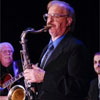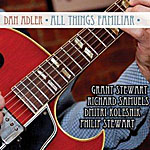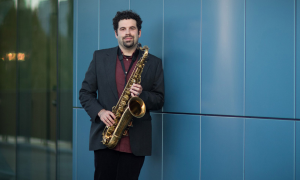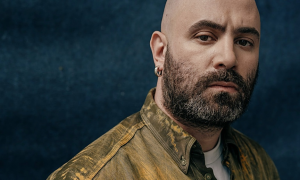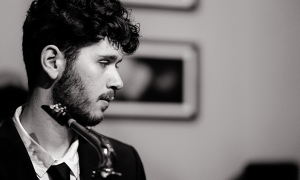Home » Jazz Articles » Take Five With... » Take Five With Larry Slezak
Take Five With Larry Slezak
 Larry Slezak is one of Houston's great jazz saxophonists. But outside of well-known jazz venues in the southwest, he has seldom been heard on record. His debut release, No Worries treats listeners from Houston and beyond to Slezak's versatility, expressive ideas, energy and mastery of the saxophone.
Larry Slezak is one of Houston's great jazz saxophonists. But outside of well-known jazz venues in the southwest, he has seldom been heard on record. His debut release, No Worries treats listeners from Houston and beyond to Slezak's versatility, expressive ideas, energy and mastery of the saxophone.Instrument(s): Saxophone.
I knew I wanted to be a musician when... I was 13 years old and my father took me to Carnegie Hall to see Louis Armstrong. It's fair to say that everything I apply in my relationship with an audience, when I perform, I learned from him that night.
I learned about giving recognition to others on the bandstand and explaining to the audience why they were there and why they were important. I learned about giving everyone else on the bandstand some musical individual time. Whether solos or entire pieces played by one person. Then the audience was able to see and understand the skill of that person, without being distracted by the other members.
I learned about individual excellence and how people of great skill can work together for a common cause. I learned how important it is to make the distance between a performer and the audience disappear, if the music was to be effective.
And I learned all of that stuff that night. And I tried to apply it all the time. And I have my entire life.
Your sound and approach to music: We have an expression in the band that it's not about us, it's about the music. That's how we feel about it. I mean, it's great that we're able to play the music, that we can play together and we have skill within the art. But it's not about us; it's about what the music means to people.
Our album No Worries showcases the skills of people who I work with and care about very much. We are very much a family, besides a band. We're all together on this recording and people can hear what we do together. That's a big deal to me. It means a lot.
It's part of the goal that album will continue to represent people that I care about doing an art that I love.
Your teaching approach: I've been teaching at Rice University since the mid-eighties. I started out there teaching improvisation. Somewhere in the '90s I took over the Rice Jazz Ensemble, a traditional big band, because the big band was too busy in other areas.
Teaching has changed me in several ways. When you teach what you do, it clarifies what you do. Instead of just doing it on automatic pilot, now you have to verbalize what you do. That's one of the things that made me sit up in the middle of the night for two months trying to figure out how to verbalize basic concepts of improvisation. As you go on teaching, and teach more advanced students, you must be more literate and accurate in your choice of words to describe more finite and detailed aspects of performing.
The fact is that you're learning just as much as the student is learning. He's growing in the subject matter. You're growing in your ability to clarify the subject matter. It helps you do it better.
Because of teaching, I'm a better musician than I ever was.
Road story: Your best or worst experience: Music has rewarded me in so many ways, so many times, and it continues to do so. The people I've met, played for, played with, those who played for me, the audiences I've played for, and the students I've taught. The students' parents who say thanks for difference you made in my child's life.
These kind of rewards ... It's a wonderful thing to have happen to you.
You start out saying I want to be a tenor saxophonist. Then it ends up what it is now. It still baffles me. God knows I'm grateful. It's amazing, all of the things that have happened to me as a result of music.
Did you know... I've worked with cars since I was 12 years old. I work on my house, doing plumbing and electricity and installing carpets.
I like doing blue collar stuff with my hands. I feel it keeps me grounded to people who don't have the gift that I have. People involved in art, many times, can lose touch with regular folks. To me, art isn't good unless it speaks to regular folks.
I've always enjoyed watching carpenters, roofers, brick layers. Any type of blue collar work, I've always liked it.
Music isn't relaxing, it's emotionally draining. At least at the level that I try to perform it. So I try to relax by fixing things. Over my lifetime I've learned to do a lot of that. But the first thing was working on cars.
Tags
PREVIOUS / NEXT
Support All About Jazz
 All About Jazz has been a pillar of jazz since 1995, championing it as an art form and, more importantly, supporting the musicians who make it. Our enduring commitment has made "AAJ" one of the most culturally important websites of its kind, read by hundreds of thousands of fans, musicians and industry figures every month.
All About Jazz has been a pillar of jazz since 1995, championing it as an art form and, more importantly, supporting the musicians who make it. Our enduring commitment has made "AAJ" one of the most culturally important websites of its kind, read by hundreds of thousands of fans, musicians and industry figures every month.


